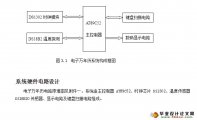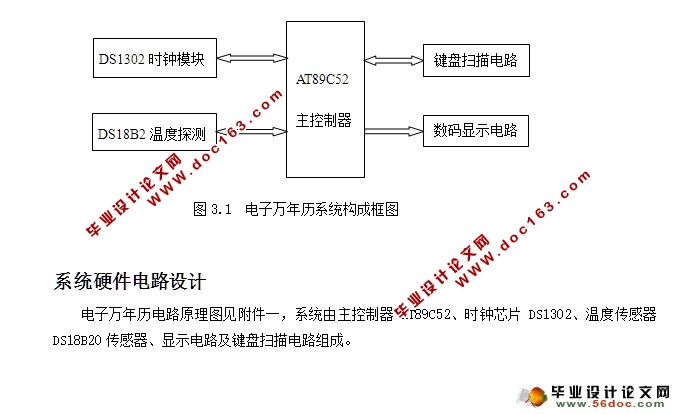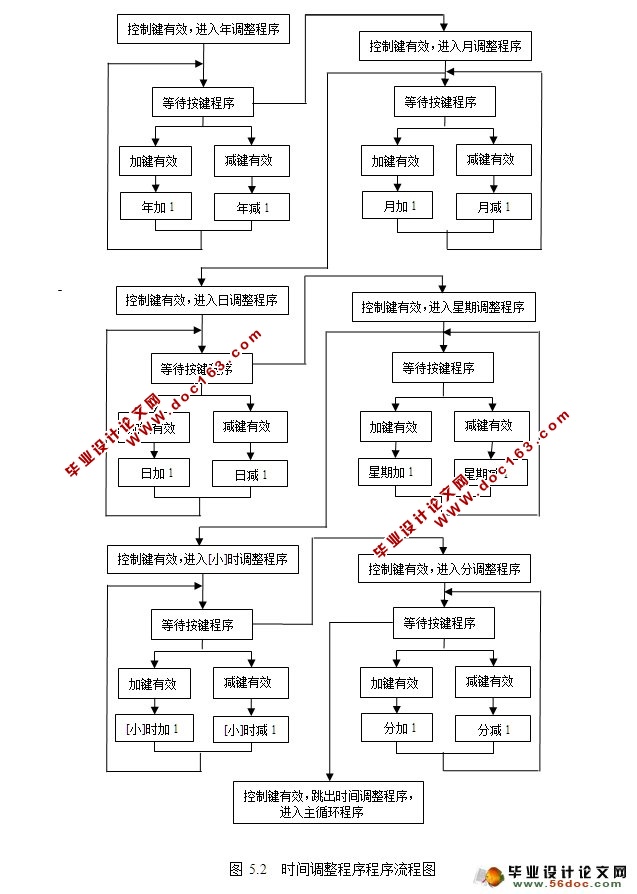基于51单片机的电子万年历的设计

基于51单片机的电子万年历的设计(论文9400字)
功能要求
1. 万年历能用数码管显示阳历年、月、日、星期、[小]时、分、秒并设置指定时间的闹铃。
2. 数字式温度计要求测温范围-50~100°C, LED数码管直读显示。
摘 要
电子万年历是单片机系统的一个应用,由硬件和软件相配合使用。硬件由主控器、时钟电路、温度检测电路、显示电路、键盘接口5个模块组成。主控模块用AT89C52、时钟电路用时钟芯片DS1302、显示模块用LED数码管、温度检测采用DS18B20温度传感器、键盘接口电路用普通按键接上拉电阻完成;软件利用C语言编程实现单片机程序控制。单片机通过时钟芯片DS1302获取时间数据,DS18B20采集温度信号送该给单片机处理,单片机再把时间数据和温度数据送给74LS154译码,然后通过三极管C9015放大驱动LED数码管显示阳历年、月、日、时、秒、闹钟、星期、温度。
关键词 电子万年历;单片机;温度传感器;时钟;数码显示
Abstract
Electronic perpetual calendar which is an application of the single-chip processor system, is utilized by combining hardware and software. And Hardware is composed of five modules: Main control unit, clock circuit, temperature test circuit, display circuit, keyboard interface. Main control board adopts AT89S52, clock circuit adopts the DS1302 clock chip, display module adopts the LED digital tube, and temperature test adopts the DS18B20 temperature sensor, keyboard interface circuit is completed by connecting ordinary button with pull-up resistor. Software takes advantage of C to program, so as to realize the programmed control of single-chip processor. Single-chip processor gets the time data through using the DS1302 clock chip. The DS18B20 gathers temperature signals and transmits them to single-chip processor. Then, single-chip processor transmits the time data and the temperature data to the 74LS154 decoder. Lastly, the LED displays solar calendar year, year, month, day, hour, minute, second, alarm clock, week and temperature with being enlarged and driven by the C9015 triode. [来源:http://www.doc163.com]
Keywords: Electronic perpetual calendar; single-chip processor; temperature sensor; clock; digital display
[来源:http://www.doc163.com]


目 录
摘 要 I
ABSTRACT II
1 引言 1
2 功能要求 1
3 方案论证与设计 1
3.1 控制部分的方案选择 1
3.2 测温部分的方案选择 1
3.3 显示部分的方案选择 2
4 系统硬件电路设计 2
4.1 主控器 AT89C52 2
4.2 时钟电路 DS1302 3
4.2.1. DS1302的性能特性 3
4.2.2 DS1302数据操作原理 3
4.3 测温电路的设计 5
4.3.1 温度传感器工作原理 5
4.3.2 DS18B20与单片机的接口电路 8
4.4 显示电路的设计 9
4.5 键盘接口的设计 10
5 系统程序的设计 10
5.1 阳历程序设计 10
5.2 时间调整程序设计 11
5.3 温度程序设计 12
5.3.1 主程序 12
5.3.2 读出温度子程序 12
5.3.3 温度转换命令子程序 12
5.3.4 计算温度子程序 13
5.3.5显示数据刷新子程序 13
6 调试及性能分析 13
6.1 调试步骤 14
6.2 性能分析 14
7 总结 14
参考文献 14
致 谢 14 [资料来源:http://www.doc163.com]
